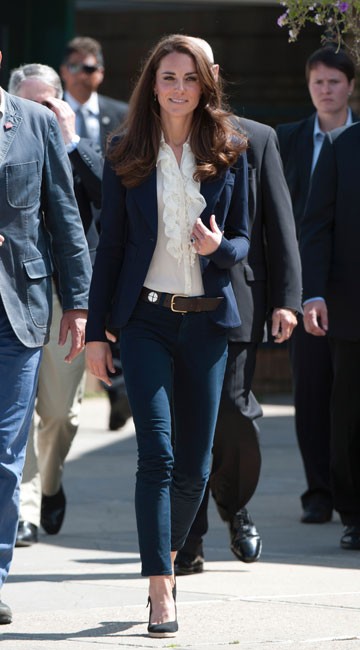A reader recently wrote:
As a college student on work study I’ve been seeking other on-campus employment opportunities that will get me out of the cafeteria and into a position more in line with my future goals. I’ve found an opening as a student ambassador for a leadership office on campus and have already applied. I have recently been told, however, that placement for this position will be determined through a group interview.
This makes me really nervous, as I am an introvert who does not dominate in group conversations and I am concerned about coming off as someone who doesn’t care about this position. My questions to you are:
- What advice do you have for introverted participants in a group interview?
- How do show the interviewer that I would be a good candidate for this position in a short amount of air time?
Group interviews?! DOES THE DEGRADATION NEVER END?
I cannot help but be reminded of this.
On the one hand, I’m offended on behalf of all introverts.
On the other hand, I have to admit that “student ambassador for a leadership office” is the kind of job for which a group interview does make a certain sort of sense. One might presume that the best “ambassadors” would be extroverts — or that they’d be introverts who know how to perform as extroverts, much as, say, Obama is rumored to be.
You’re going to need to perform.
Here’s what I would do:
- It sounds like you already have some contact with the office. See if you can get a little more information and also get your name burned into the decisionmakers’ minds a bit more. Maybe an email like, “Fantastic, looking forward to it! I have never done a group interview before. What can you tell me about the format?” It’s possible that there will be some sort of collaborative activity, and you’ll be judged on how you work with the other candidates. (It’s also possible that the interviewer is just too lazy to interview people normally.) But the purpose of the email isn’t just to actually find out about the format — it’s to reiterate your interest and solidify yourself into the interviewer’s mind.
- It occurs to me that, with an interviewer having to take in so many candidates at once, appearances probably matter quite a bit. Don’t rush in straight from class. Don’t carry a backpack (or a bunch of crap in general). No kid stuff.
- But you also don’t want to stuff yourself into a suit like you’re pretending to be forty, as you are supposed to be representing students. If nobody on campus wears high heels, you might look a bit silly tromping around in patent-leather pumps. My personal go-to outfit for something like this would be: navy blazer, simple white top, cool skinny pants, wedges. Simple stud earrings. Possibly a bold, heavy, lies-flat gold or silver necklace (but nothing boho, loose, or jangling). Fresh haircut. See Kate Middleton rocking this look here and here. I’m not a fashion expert, though. I don’t know how people dress on your campus, what you look like, what the weather is like where you are, etc. But do put some effort into this. Maybe put on the outfit you’re considering and then consult an older person, like a female professor you’re friendly with. Fair or not (um, not?), I’m sure appearances matter more when you get such a small slice of the available talking time.

- Arrive early. Introduce yourself to the other candidates as they arrive. Be normal and professional — you’re not trying to psych them out. Remember people’s names. Really see each person. Listen to them during the brief conversation you have. And memorize their names.
- When the group interview starts, listen intently to what others say, and acknowledge them by name when you can get a word in. As in, “I like that, James. My answer is similar to James’s contribution, but from the perspective of….” You’re not competing with James. You just acknowledged his contribution (and used his name!) Note that you’re not saying, “My answer is similar but better.” You’re saying, “My answer is similar, but from a different point of view. Aren’t we a wonderful rainbow of diversity?” Now you are acting like a leader. Show, don’t tell, you know? Leaders don’t compete. They bring people together. You are above competition.
- It seems like you’re going to have to fight for airtime in a group interview, unless the interviewer calls on people in turn or something. If it’s a free-for-all, demonstrate your leadership skills by casually but confidently suggesting, “How about we go around the circle on this one, so everyone gets a chance to answer?” Instead of seeming petty by fighting for yourself, now you seem like a leader by fighting for fairness for all.
- I read somewhere that high-status people — leaders — say “I” much less often than low-status people. Leaders talk about ideas, not themselves.
- Don’t talk fast. Don’t look anxious or jumpy. Think, “I have just gotten back from a VERY relaxing trip to Hawaii. I look amazingly well-refreshed, sun-kissed, and — quite frankly — quite wealthy.” Sit in your chair like someone who is relaxed and happy from your amazing trip to Hawaii. Don’t give the impression that you’re SO AMBITIOUS that you’re harried and busy and sleep-deprived. You’re not some kid who’s overcommitting herself to get ahead. You’re a natural-born leader, who just happens to look like she’s just gotten a massage while discovering that her stock portfolio has increased greatly in value. You’re here because you want to do the job for its own sake, and you have some things to say about that.
- Slip in some magic words — for instance, here are the ten most powerful words in advertising. “New”, “proven”, “discover”, and “results” all sound appropriate in an interview. I’m also a big fan of associating yourself with the word “intellectual” in the workplace. Of course, you can’t just say you’re intellectual. Try to slip in something like, “I’ve always understood that the intellectual justification for doing it this way is ABC, but I think we also need to take into account XYZ.”

- As things break up, be cordial with other participants. Shake hands with interviewers if that’s not going to make you seem like a total suck-up, and with the other applicants if that’s not totally weird. Don’t try to linger and be the very last one to leave (too transparent), but don’t rush out like you have somewhere else to be.
- Send a thank-you email immediately after. Maybe even have something saved in Drafts on your phone so afterwards you can adjust the text as needed and send right away. A ballsy move might be to send a second email a couple hours later, with a short note calling up some research or a link related to something that was discussed in the group interview. As in, “In today’s interview we discussed X, and that reminded me very much of a study I read about in the Harvard Business Review. I found it here — hope this is of interest. There are some good suggestions that are really in line with [organization]’s mission.”
The interview is probably coming up pretty soon, but maybe you could practice these skills by inviting some other students you don’t know too well to a study group. Perhaps you have a class where there’s a test coming up soon. You arrange a study group open to anyone in the class. And then arrive early, greet people, memorize names, jump in to suggest that everyone go around the circle…. Of course this isn’t totally the same as a group interview, but it’s still a chance to practice the version of yourself that needs to show up to the interview.
And when I say, “version of yourself,” well, welcome to the working world.
I’ve written before that I’m not against acting fake sometimes. If we were “authentic” all the time, we’d basically be monkeys punching each other and touching ourselves in the zoo. Acting a bit fake is the basis of most social and professional interactions. You just have to show up with the right version of fake. That’s not incompatible with going on to do real things and make real contributions.








